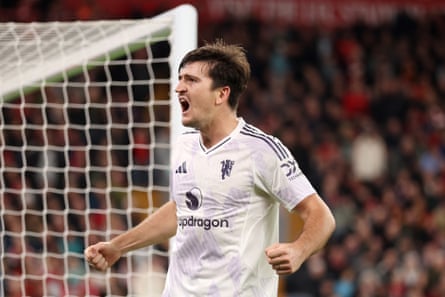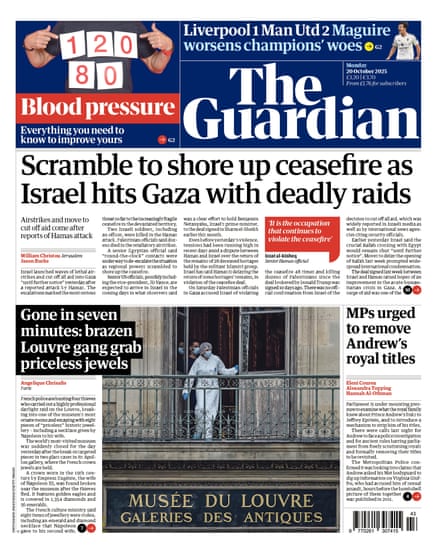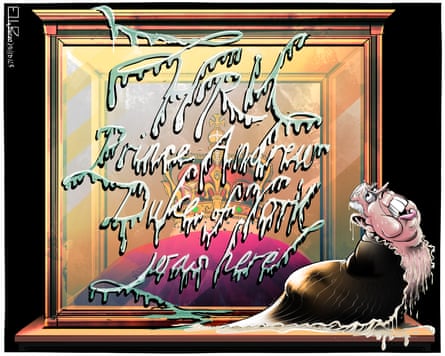Good morning. It looked, for a moment, as if Donald Trump had finally taken a clear side in the war between Russia and Ukraine: with hints that he might be ready to provide Tomahawk missiles, and a vaunted White House meeting with Volodymyr Zelenskyy, some observers thought he was on the brink of rowing in behind Ukraine in a decisive way.
Then he got on the phone with Vladimir Putin, and agreed to a face-to-face meeting within the next two weeks. And, after the White House meeting on Friday, Trump downplayed the idea that the missiles would be provided. Later reports suggested that the meeting was a “shouting match” in which Trump echoed Russian talking points and added: “If [Putin] wants it, he will destroy you.”
The diplomatic wrangling is crucial to the outcome of the war – but so too is the picture on the battlefield, now often overlooked. For today’s newsletter, I spoke to Francis Farrell, a reporter for the Kyiv Independent who writes the War Notes newsletter, about the brutality of conditions for the soldiers at the “zero line”, the point where the two sides meet – and how that sets the context for Trump’s oscillating view of the war. Here are the headlines.
Five big stories
-
Israel-Gaza war | Israel launched waves of lethal airstrikes on Sunday and cut off all aid into Gaza “until further notice” after a reported attack by Hamas, in escalations that marked the most serious threat so far to the increasingly fragile ceasefire. Israel later said that it had “begun the renewed enforcement of the ceasefire”.
-
Royals | The Metropolitan police are looking into claims that Prince Andrew asked his taxpayer-funded close protection officer to uncover information about Virginia Giuffre hours before the emergence of a bombshell picture of them together. The news follows Friday’s announcement that Andrew had relinquished his royal titles.
-
China-UK relations | Approving a Chinese super-embassy in east London could be unlawful if ministers gave Beijing assurances about the project in advance, a top planning lawyer has concluded. The news came as the government denied any political interference in the decision to drop charges against two men accused of spying for China.
-
France | French police are hunting four thieves who carried out a highly professional daylight robbery on the Louvre, breaking into one of the museum’s most ornate rooms and escaping with eight pieces of “priceless” historic jewellery, including a necklace given by Napoleon to his wife.
-
Reform UK | The leader of Reform UK’s flagship local authority has told councillors that she has launched a hunt for the “cowards” who leaked a recorded meeting in which she said those who disagreed with decisions would have to “fucking suck it up”. Bitter divisions among Reform members of Kent county council were laid bare at the weekend by the Guardian.
In depth: ‘The battlefield is still the most important factor’
Last month, Francis Farrell wrote a superb piece for the Kyiv Independent based on interviews with infantrymen who had been stationed at the “zero line”, the front-of-the-front in the war between Russia and Ukraine. “It’s always been the toughest job, in the toughest conditions,” he said. “But in 2025, what we’ve seen is a new level of misery for the infantryman: whereas a week or two there might have been standard a year ago, it’s now a month or two if they’re lucky.”
The diplomatic wrangling between Volodymyr Zelenskyy, Donald Trump and Vladimir Putin is obviously central to what happens next – but, Farrell said: “The battlefield is still the most important factor. The strongest possible card Ukraine could have going into negotiations is a rock-solid defence. And the strongest card Russia could have is a frontline in a state of collapse.”
What is life like on the ‘zero line’ today?
One soldier Farrell spoke to, an ex-convict called Ruslan, spent almost five months in a tiny dugout under almost daily fire. “There is no way we could get anywhere without infantry,” Ruslan said. “Sometimes out there you can go crazy thinking ‘why are we sitting here?’ but we know we are essential. I wanted to become a hero, and I believe I did.”
The postings are longer because of the sapping of Ukrainian manpower. Meanwhile, the “human wave” that once characterised Russian assaults has now been largely replaced by “a constant stream of one to three people trying to infiltrate Ukrainian lines, cause chaos, and dig in”, Farrell said. As well as that threat, Ukrainians at the front must also contend with increasingly lethal attacks from Russian drones.
“It is now possible to hunt a single human being with high-precision strikes,” Farrell said. “These drones have scaled exponentially, especially over the last year.” Similarly, whereas once maybe one in 100 vehicles going in or out of a town near the frontline might have been hit, it’s now more like one in two. “And drone teams 2-5km from the zero line, or artillery teams 15-20km back who used to be really quite safe, are all to an extent coming under the same threat umbrella.”
What is the strategic picture at the front?
In this podcast, former Ukrainian defence minister Andriy Zagorodnyuk says that while a couple of months ago some analysts were “openly saying that Ukraine was losing the war”, now the consensus is that “the Russian summer offensive hasn’t got any substantial acquisitions and hasn’t changed the situations strategically”.
Farrell broadly agrees: “Russia’s gains haven’t been strategically significant, they haven’t come anywhere near some kind of operational breakthrough. It’s a war of attrition.”
The fiercest fighting continues to be in Donetsk oblast in the far east of Ukraine; Russia has made its advances there at a steep casualty rate – more than 1,000 a day, according to Ukrainian estimates. But with parts of the front stable and others seeing Russian incursions and Ukrainian counterattacks, there is also a sense that “winning” or “losing” has become almost irrelevant because the general position is so entrenched.
What has the impact been of Russian air attacks?
As the changing threat to Ukrainian infantry illustrates, if the frontlines remain largely frozen, the aerial war is much more dynamic. Justin Bronk of the Royal United Services Institute told Peter Beaumont that “it is one of the areas in the conflict where we have seen the most significant change in the past 18 months”, with “first person view” (FPV) drones in much greater use, and a sharp increase in Russian use of glide bombs – conventional ordnance fitted with pop-out wings and satellite guidance that can be launched behind the frontlines and hit targets at a greater range without as much risk to the carrying aircraft.
Russia launched more than 3,000 drones, 92 missiles and almost 1,400 glide bombs against Ukraine between 5 October and 12 October alone, targeting cities and critical infrastructure including energy plants. A barrage of attacks last week caused blackouts in eight regions.
“It looks like a massive campaign against energy and heating infrastructure ahead of winter,” Farrell said. “Ukrainians are used to this – it doesn’t come as a shock to them, and people are used to getting six hours or less of electricity a day.” But modifications to Russia’s arsenal, making drones and missiles better at evading air defences, may give Moscow the upper hand.
The issue is not so much about generation in the east, where petrol and diesel generators are the primary source of military power, he added. “It’s about total warfare – on the economy, and on society. What we’re seeing at the moment is just the beginning.”
What about Ukrainian attacks within Russia?
Meanwhile, Ukraine has been conducting long-range strikes against Russian oil refineries – with, for example, three strikes on the Saratov refinery within a month. In this excellent report, Reuters estimates that there have been at least 58 attacks on key Russian energy sites since the start of August, reaching as far as 1,200 miles into Russian territory. There were only three such strikes in June and July.
Analysts tend to view these attacks as a thorn in Putin’s side rather than a critical blow against Russian military power – but note that it is a source of pain to ordinary Russians, with refining capacity reduced by as much as 21% at the end of August.
“It’s hard to calculate the tangible impact on the Russian economy, which is still a behemoth,” Farrell said. “But it is definitely a blow to the social contract that Putin has with his people, where if they are loyal to him he is the provider of strength and stability.”
A key question is whether Ukraine can maintain the pace of these attacks at a level that could knock refineries out of service altogether – and, for now, any claim that this might be gamechanging appears fanciful. “You can compare it to when Russia first started hitting Ukrainian energy infrastructure,” Farrell said. “A pro-Russian observer might have thought that Ukraine would surrender. But Ukraine adapted, the infrastructure was repaired, Russia didn’t have the missiles it needed to continue the intensity of the campaign, and that was that.”
How significant could Trump’s meeting with Putin be?
Trump’s habit of constant recalibration in his attitude to Zelenskyy and Putin – at different points suggesting that he has lost patience with both and is ready to make a decisive shift in his position, only to back away – was repeated last week. After suggesting that he might provide Tomahawk missiles to Ukraine, he played that prospect down on Friday. The Financial Times reported that he tossed aside Ukrainian maps of the front and told Zelenskyy that Putin had told him the conflict was a “special operation, not even a war”. That is not promising mood music for Kyiv ahead of his next meeting with Putin.
“This is the same circus,” Farrell said. “In August he seemed very close to imposing harsh consequences on Putin, and then Putin proposed the Alaska meeting and Russia was off the hook. Now it looks like that could happen again if Moscow plays its cards right.”
after newsletter promotion
The Tomahawk missiles, which would significantly extend Ukraine’s ability to hit targets deep in Russian territory, would be very valuable. (Dan Sabbagh has more on their significance in this piece.) “But it’s really just part of the bigger picture,” Farrell said. “Selling them to Ukraine might be a sign that he has finally made a decision. But Ukrainians aren’t putting too much hope in the idea that this merry-go-round will finally be over.”
What else we’ve been reading

-
Marjorie Taylor Greene (pictured above), Georgia congresswoman and scourge of the left, has always seemed more Maga than Maga – so what is behind her curious shift of late, gaining Democrat fans with her stance on healthcare, Gaza and the Epstein files? David Smith and George Chidi investigate. Toby Moses, head of newsletters
-
The requirements on migrants keep ratcheting up, writes Nesrine Malik: voluntary work, a longer wait for citizenship, A-level standard English. She is very persuasive on how badly these policies misunderstand what really prevents integration on an “island of strangers”. Archie
-
The flashback series – where stars recreate photos from their youth – always offers a different insight into its subjects, and Huey Morgan doesn’t disappoint: “Writing and playing songs became a catalyst; a way to get out of myself, to derail those feelings of not being good enough”. Toby
-
Sophie McBain wrote a brilliant, alarming piece for Saturday magazine about what might be the dawn of a “stupidogenic” society, where we outsource everything original or difficult to AI: “Until recently you could only outsource remembering and some data processing to technology; now you can outsource thinking itself.” Archie
-
Another excellent AI piece: while we all panic about it stealing our jobs (not me boss, I’m irreplaceable), Pip Finkemeyer asks: if tech bros were so wrong about social media’s benefits, why should we believe the hype about AI? Toby
Sport

Football | Harry Maguire, pictured above, stunned Anfield with a late winner for Manchester United. Liverpool fell behind in the second minute, and fought back to level the game only to be denied at the death in a 2-1 loss. Elsewhere, Aston Villa defeated Tottenham 2-1.
Cricket | England held their nerve to defeat India by four runs and reach the Women’s Cricket World Cup semi-final.
Formula One | Max Verstappen won the US Grand Prix with a dominant run for Red Bull at the Circuit of the Americas. With victory he has staked his claim as a genuine contender in an increasingly tight Formula One world championship battle – his title rival Lando Norris beaten into second and Ferrari’s Charles Leclerc into third.
The front pages

“Scramble to shore up ceasefire as Israel hits Gaza with deadly raids” – that’s the Guardian this Monday morning and the i paper goes on similar lines: “Ceasefire in peril as Israel bombs Gaza, blocks aid and accuses Hamas of attack”. The Times has “Prince’s ‘bid for police to investigate his accuser’” while the Mail’s angle is “King’s threat to shame Andrew by stripping titles”. The Metro rubs it in: “And when he was down he was down”.
The Daily Mirror calls it a “Scandal with no end”. The Daily Express runs with “Mayor accused over grooming gangs ‘cover-up’ in capital”. Today’s Daily Telegraph says “Trump tells Kyiv: take deal or be destroyed”. Taco news in the Financial Times as well: “Trump warned Zelenskyy in meeting that Russia could ‘destroy’ Ukraine”.
Today in Focus

Boriswave, fighting-age men, cultural Marxism: how the far right is changing how we speak
Why are the online far right so successful in shaping our political language? With Dr Robert Topinka
Cartoon of the day | Ella Baron

The Upside
A bit of good news to remind you that the world’s not all bad

The “lavender marriage”, once the preserve of queer celebrities forced to conform to Hollywood’s heteronormative rules, is back. Only this time, those entering into less-than-traditional forms of wedlock are doing so out of choice. The term has been co-opted online as a shorthand for loving, committed relationships that do not centre on conventional romance and sexual desire. As the Guardian’s Emma Beddington tells traditionalists, whether it’s straight women marrying gay men, asexual pals entering into a platonic life partnership, or best mates shacking up so they can split the bills, love in all its forms is a cause for celebration.
Sign up here for a weekly roundup of The Upside, sent to you every Sunday
Bored at work?
And finally, the Guardian’s puzzles are here to keep you entertained throughout the day. Until tomorrow.
Disclaimer : This story is auto aggregated by a computer programme and has not been created or edited by DOWNTHENEWS. Publisher: theguardian.com




